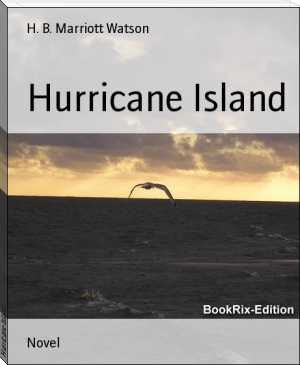The Stolen Bacillus and Other Incidents by H. G. Wells (best books to read now .TXT) 📖

- Author: H. G. Wells
Book online «The Stolen Bacillus and Other Incidents by H. G. Wells (best books to read now .TXT) 📖». Author H. G. Wells
Even in these days of celestial photography, work done in a purely temporary erection, and with only the most primitive appliances in addition to the telescope, still involves a very large amount of cramped and motionless watching. He sighed as he thought of the physical fatigues before him, stretched himself, and entered the observatory.
The reader is probably familiar with the structure of an ordinary astronomical observatory. The building is usually cylindrical in shape, with a very light hemispherical roof capable of being turned round from the interior. The telescope is supported upon a stone pillar in the centre, and a clockwork arrangement compensates for the earth’s rotation, and allows a star once found to be continuously observed. Besides this, there is a compact tracery of wheels and screws about its point of support, by which the astronomer adjusts it. There is, of course, a slit in the movable roof which follows the eye of the telescope in its survey of the heavens. The observer sits or lies on a sloping wooden arrangement, which he can wheel to any part of the observatory as the position of the telescope may require. Within it is advisable to have things as dark as possible, in order to enhance the brilliance of the stars observed.
The lantern flared as Woodhouse entered his circular den, and the general darkness fled into black shadows behind the big machine, from which it presently seemed to creep back over the whole place again as the light waned. The slit was a profound transparent blue, in which six stars shone with tropical brilliance, and their light lay, a pallid gleam, along the black tube of the instrument. Woodhouse shifted the roof, and then proceeding to the telescope, turned first one wheel and then another, the great cylinder slowly swinging into a new position. Then he glanced through the finder, the little companion telescope, moved the roof a little more, made some further adjustments, and set the clockwork in motion. He took off his jacket, for the night was very hot, and pushed into position the uncomfortable seat to which he was condemned for the next four hours. Then with a sigh he resigned himself to his watch upon the mysteries of space.
There was no sound now in the observatory, and the lantern waned steadily. Outside there was the occasional cry of some animal in alarm or pain, or calling to its mate, and the intermittent sounds of the Malay and Dyak servants. Presently one of the men began a queer chanting song, in which the others joined at intervals. After this it would seem that they turned in for the night, for no further sound came from their direction, and the whispering stillness became more and more profound.
The clockwork ticked steadily. The shrill hum of a mosquito explored the place and grew shriller in indignation at Woodhouse’s ointment. Then the lantern went out and all the observatory was black.
Woodhouse shifted his position presently, when the slow movement of the telescope had carried it beyond the limits of his comfort.
He was watching a little group of stars in the Milky Way, in one of which his chief had seen or fancied a remarkable colour variability. It was not a part of the regular work for which the establishment existed, and for that reason perhaps Woodhouse was deeply interested. He must have forgotten things terrestrial. All his attention was concentrated upon the great blue circle of the telescope field—a circle powdered, so it seemed, with an innumerable multitude of stars, and all luminous against the blackness of its setting. As he watched he seemed to himself to become incorporeal, as if he too were floating in the ether of space. Infinitely remote was the faint red spot he was observing.
Suddenly the stars were blotted out. A flash of blackness passed, and they were visible again.
“Queer,” said Woodhouse. “Must have been a bird.”
The thing happened again, and immediately after the great tube shivered as though it had been struck. Then the dome of the observatory resounded with a series of thundering blows. The stars seemed to sweep aside as the telescope—which had been undamped—swung round and away from the slit in the roof.
“Great Scott!” cried Woodhouse. “What’s this?”
Some huge vague black shape, with a flapping something like a wing, seemed to be struggling in the aperture of the roof. In another moment the slit was clear again, and the luminous haze of the Milky Way shone warm and bright.
The interior of the roof was perfectly black, and only a scraping sound marked the whereabouts of the unknown creature.
Woodhouse had scrambled from the seat to his feet. He was trembling violently and in a perspiration with the suddenness of the occurrence. Was the thing, whatever it was, inside or out? It was big, whatever else it might be. Something shot across the skylight, and the telescope swayed. He started violently and put his arm up. It was in the observatory, then, with him. It was clinging to the roof, apparently. What the devil was it? Could it see him?
He stood for perhaps a minute in a state of stupefaction. The beast, whatever it was, clawed at the interior of the dome, and then something flapped almost into his face, and he saw the momentary gleam of starlight on a skin like oiled leather. His water-bottle was knocked off his little table with a smash.
The sense of some strange bird-creature hovering a few yards from his face in the darkness was indescribably unpleasant to Woodhouse. As his thought returned he concluded that it must be some night-bird or large bat. At any risk he would see what it was, and pulling a match from his pocket, he tried to strike it on the telescope seat. There was a smoking streak of phosphorescent light, the match flared for a moment, and he saw a vast wing sweeping towards him, a gleam of grey-brown fur, and then he was struck in the face and the match knocked out of his hand. The blow was aimed at his temple, and a claw tore sideways down to his cheek. He reeled and fell, and he heard the extinguished lantern smash. Another blow followed as he fell. He was partly stunned, he felt his own warm blood stream out upon his face. Instinctively he felt his eyes had been struck at, and, turning over on his face to protect them, tried to crawl under the protection of the telescope. He was struck again upon the back, and he heard his jacket rip, and then the thing hit the roof of the observatory. He edged as far as he could between the wooden seat and the eyepiece of the instrument, and turned his body round so that it was chiefly his feet that were exposed. With these he could at least kick. He was still in a mystified state. The strange beast banged about in the darkness, and presently clung to the telescope, making it sway and the gear rattle. Once it flapped near him, and he kicked out madly
 Have you ever thought about what fiction is? Probably, such a question may seem surprising: and so everything is clear. Every person throughout his life has to repeatedly create the works he needs for specific purposes - statements, autobiographies, dictations - using not gypsum or clay, not musical notes, not paints, but just a word. At the same time, almost every person will be very surprised if he is told that he thereby created a work of fiction, which is very different from visual art, music and sculpture making. However, everyone understands that a student's essay or dictation is fundamentally different from novels, short stories, news that are created by professional writers. In the works of professionals there is the most important difference - excogitation. But, oddly enough, in a school literature course, you don’t realize the full power of fiction. So using our website in your free time discover fiction for yourself.
Have you ever thought about what fiction is? Probably, such a question may seem surprising: and so everything is clear. Every person throughout his life has to repeatedly create the works he needs for specific purposes - statements, autobiographies, dictations - using not gypsum or clay, not musical notes, not paints, but just a word. At the same time, almost every person will be very surprised if he is told that he thereby created a work of fiction, which is very different from visual art, music and sculpture making. However, everyone understands that a student's essay or dictation is fundamentally different from novels, short stories, news that are created by professional writers. In the works of professionals there is the most important difference - excogitation. But, oddly enough, in a school literature course, you don’t realize the full power of fiction. So using our website in your free time discover fiction for yourself. 




Comments (0)